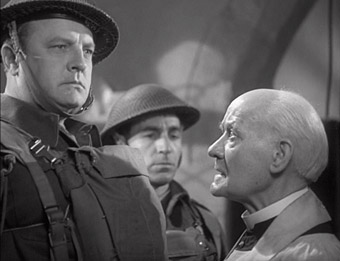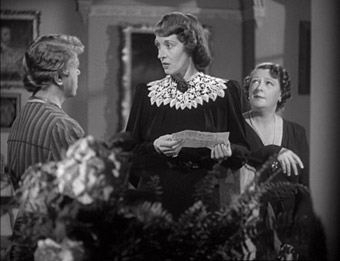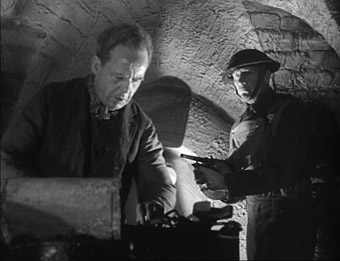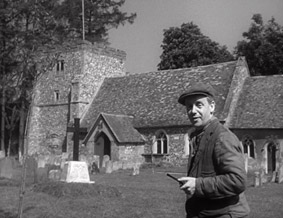|
There's
an extra feature on the 20th Anniversary Edition DVD of
Withnail and I
that, while ultimately as half-arsed as the rest of the
non-commentary featurettes, still struck a chord in this
corner of the universe. It involved two of the film's more
obsessive fans travelling to the locations at which key
scenes were shot and photographing themselves at the exact spots where key characters
had stood in the film. To the average filmgoer this no doubt seems the
epitome of movie geek behaviour and they may be right. I'll be coming back to this.

Back
in the early eighties during a period of unemployment, I
happened upon a film one afternoon that I had neither heard
of nor had particularly high expectations for. A lot of
small scale, not-too-well known British films were shown
on TV in the afternoons in those days and for all I know
may still be. Most were polite, solidly made and largely unmemorable.
This one was called Went the Day Well?
and it was adapted from a short story by none other than
Graham Greene. I was intrigued, in part for the Greene connection,
but also because of the question mark in the title. Film titles do
not usually pose questions. The film left me stunned. Really. OK, it's
not going to have that effect on everyone, but I'd genuinely
never seen a film quite like it. Sure, in many ways it could
be seen as a typical British wartime propaganda thriller,
but there are so many things that... but I'm getting ahead
of myself. Let's get back to that opening paragraph.
My
closest friend at the time was man both brilliant and infuriating,
someone I have already (in my recent Blade
Runner piece) identified as as my own personal
Withnail. It so happens that he paid me a visit the day
after my revelatory viewing of this film, and by chance I'd decided
to tape it on a recently acquired device known as a video
recorder. I didn't usually tape the afternoon films – it
must have been that question mark. I showed Withnail the
film and he was similarly astonished. As it happened,
this particular screening was introduced by critic Leslie
Halliwell, a man whose sniffy views of modern cinema frequently
drove us both to distraction. Here, however, he was championing
a film that he felt had been too little seen, and in the
process of doing so revealed that it had been shot in the
village of Turville in Oxfordshire, and assured us that little had
changed there in the intervening years. Watching this intro a
second time, the two of us had ourselves a movie moment,
one where the exact same idea hit us both simultaneously. We decided that it would be somehow be fun to travel
by coach to Windsor and walk to Turville with huge packs
and a tent on our backs. We weren't regular campers and
took little in the way of food, figuring we'd get supplies
on the way. We didn't see a shop for three bloody days.
But Mr. Halliwell was right – a few TV aerials aside, Turville
was the same village we'd seen in Went the Day Well?.
And yes, we did our photographs, with Withnail standing
in for the old man who introduces and rounds off the story.
It was a trip back in time that I remember to this day.
Since then Turville has returned to the screen to provide
exterior shots for the Vicar of Dibley.
For me it will always be Bramley End.
|
|
Turville
1942 (left) and 1982 (right). The memorial to the
fallen of the Battle of Bramley End is a prop, but
otherwise, save for tree growth, the churchyard
and other buildings in the village remained unchanged. As you can doubtless see, I was still learning how to choose a lens of the correct focal lengths to achieve specific effects, hence the mismatch of perspectives.
|
If
you're new to the film, and I would imagine a fair few of
you are, you'll be wanting to know a bit about it. During
WW2, a regiment of British soldiers arrive unannounced in
the the village of Bramley End for manoeuvres. The locals are initially surprised by their arrival but soon make the men welcome,
but all is not what it seems. A number of small incidents
eventually alert the locals to what is really going on, that these are not British soldiers at all but German fifth
columnists, there to help lay the ground for an invasion force. Once their true identities are discovered they
take over the village, imprisoning most of its residents in the local church
and holding the rest at gunpoint while they prepare their
plans. But the English are not prepared to just sit back
and let the invaders have their way, and soon the fight
back begins.
One
of the striking aspects of Went the Day Well?
is that it has all the outward appearance of a post-war
film but was actually made in 1942, when things weren't
exactly going swimmingly for the allies. And yet the introduction
talks of a war that has been satisfactorily concluded and
Hitler getting what was coming to him. Optimistic propaganda
perhaps, but pulled off with conviction and bravado.
The soldiers are not your typical wartime bad guys, either. Sure,
they commit acts of brutality that no Johnny English would
even consider, and in one scene it is suggested that
their idea of family values is very different from ours,
but they are also organised, intelligent, and speak
English as if born to it. There's even a moment in the first
half when a non-English speaking German soldier is almost caught
out and you find yourself rooting for him, willing one of
his comrades to step in and save his hide.
Bramley End represents something of an English idyll, a
peaceful countryside location where all levels of the
class system are represented and the barriers between them
temporarily dismantled for the war effort. The character
sheet thus includes everything from the landed gentry to
shopkeepers, land girls, young London evacuees (led by a
16-year-old Harry Fowler) and even a poacher, all of them prepared to
pull together and do their bit when the balloon goes up.
A very British picture, you might think, but the director
Alberto Cavalcanti was actually Brazilian by birth and only
moved to moved to England in 1933 after learning his trade
in France. Working first as a sound engineer for the famed
GPO Film Unit, then as a short film director for Michael
Balcon, Went the Day Well? was his first
dramatic feature.
Cavalcanti's
outsider status and documentary experience clearly enabled
him to take a more even-handed and low key approach to what
in other hands could have waved the flag from the highest
rooftop. For a first time feature director, his handling
of character and narrative bristles with confidence, and
he and scriptwriters John Dighton, Angus MacPhail and Diana
Morgan know just when to reward and frustrate the viewer,
but also how to surprise and even shock them.

The
process of discovery is particularly well handled, a series
of small slips and casual observations that point the
villagers to the truth just too late for them to do anything
about it. The second act has them imprisoned either in the
church or their homes, unaware that there is a traitor
in their midst and forced to carry on as if all was normal
to visitors to the district, who infuriatingly fail to deliver messages of
alarm smuggled into their possession. It is in this section
that the fight back begins and the first of the very real jolts
are delivered, as a German soldier is lulled into false
sense of security and then killed with an axe, a shocking
and brilliantly filmed sequence that then delivers two more
gut punches to audience expectations. This is a scene that
still leaves me reeling, in part for its striking use of
camera angles and editing, but also for a directness of
violence that was not only rare in war films of the period,
but is rendered more disturbing by its
domestic setting, a killing committed not by a soldier on the battlefield,
but a middle-aged woman in her own living room. Watching this scene is almost like seeing your own mother transformed by circumstance
into a killer.
Sequences that are dramatic by their very nature are handled
with remarkable restraint. Music is used sparingly, and
most of the action plays in almost documentary fashion,
the final stand-off at the local mansion house having almost no musical
accompaniment. It is this climactic conflict that finds
the film in more familiar territory, as the villagers barricade
themselves in the hall and do gun battle with advancing
German soldiers dressed in British uniforms (which itself
must have been an odd sight in wartime Britain).
But even here the character interplay inside the hall – resourceful
determination bolstered by earthy humour – makes for compelling
viewing. It's
also here that the film delivers its second serious jolt,
dispatching one of the most colourful central
characters in a flash when they grab a thrown grenade and
run out of the room with it to protect the children within.
Once again this stuns on you first viewing but still leaves
you reeling on you tenth – this is not the star-spangled
heroism of propagandist war cinema, but the maternal
instinct at its most acute, a mother figure protecting the
children in her charge without a thought for her own safety.
Rarely, if ever, will you see this more starkly realised
on screen.

Like
the village in which it was filmed, Went the Day
Well? has resisted the ravages of time and the qualities
that made it a special film back in 1942 are still clearly evident
and eye-opening today. It's one of those films that
most seem to stumble across by chance, as happened to me with that
TV screening back in the early 1980s. But word spreads,
and though it is still rarely discussed in the same breath
as some of the acknowledged British wartime classics, it
is at least more frequently recognised for the achievement
it was and still is and has even earned literary coverage
as part of the BFI classics collection. There may be a fair
few titles that lay better claim to the title of the best
British War Film, but I have no problem in publicly stating
that Went the Day Well?, for any number
of good reasons, is far and away my favourite.
Previously
only available as part of an Ealing Classics box set from
Warner, the film has recently been released as a stand-alone
disc at a very reasonable price by Optimum. Framed 4:3,
the correct aspect ratio, the picture quality is generally
very impressive, and I'd go as far as to say that the film
looks restored and remastered for DVD – there are blemished
there, but they appear cleaned up and are never obtrusive.
Dust spots are very rare, contrast is very good and the
sharpness is impressive for a film of this vintage. A fine
job.
The
mono 2.0 soundtrack inevitably shows its age, but is clear
and largely free of distracting background hiss, which is
only detectable at all in the quieter scenes.
Not
a thing.
A
gem of British cinema that for too long went unseen and
uncelebrated is now available for all to appreciate. If
you've never seen it then here's one for the Christmas list,
and if you know it and love it then have no fear, the transfer
on this disc does the film proud. You won't have to look
far to find it for under a tenner, which should leave you
enough for Penelope Huston's BFI Classics book on the film,
a most reasonable stand-in for the DVD's lack of extras.
|
